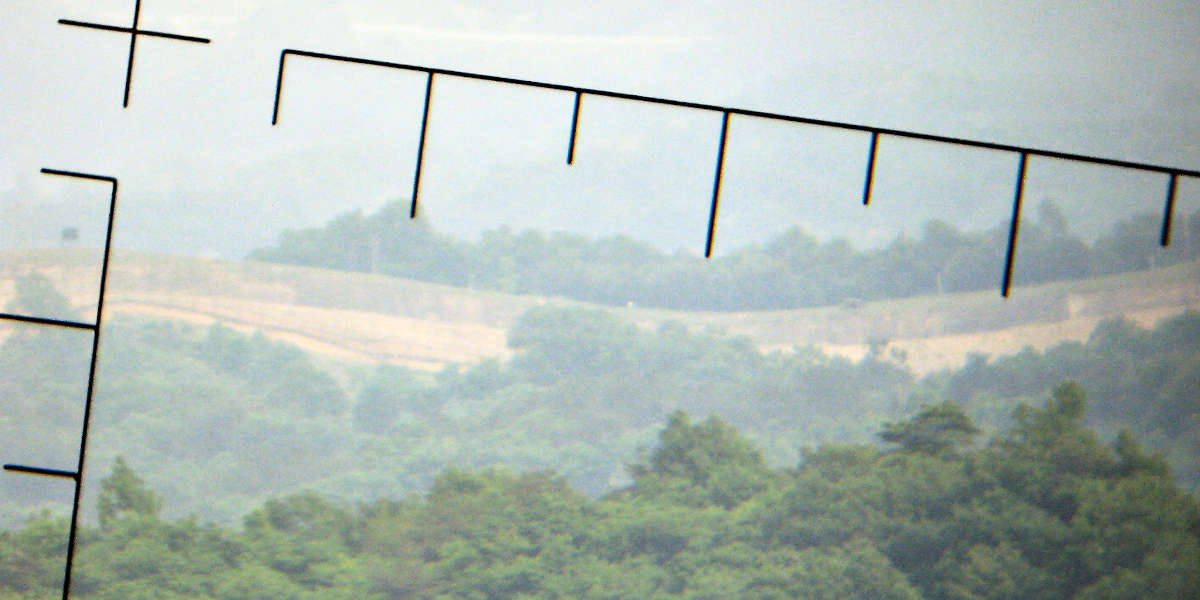In the image
The Korean wall, or anti-tank barrier, in the demilitarized zone seen through binoculars from the North Korean side [Kilroy]
Donald Trump’s reelection has been closely followed in the entire world, including Asia. There is a clear possibility that he will attempt to revert to isolationism. This is gravely feared by South Korea—currently under the United States’ security umbrella—, which feels threatened by North Korea’s nuclear weapons. After Trump winning a second term, Seoul is taking some steps to counteract both China and North Korea, especially with regards to South Korea’s policy towards North Korea, and the questions of defense spending and nuclearization.
During President Trump’s first term, relations between the United States and South Korea, traditionally very strong, were strained. This weakening of relations was especially a result of the talks between the United States and North Korea, which sidelined South Korea. In 2018, President Trump and Chairman Kim held a series of high-level talks regarding, among other issues, North Korea’s nuclear programme. As South Korea was not a party to the talks, Seoul thought that the United States might help North Korea break out of its international isolation without conditioning any reduction of sanctions to the elimination of North Korea’s nuclear weapons, which are not in compliance with the Nuclear Non-Proliferation Treaty (NPT). Consequently, South Korea feared that such a rapprochement would potentially mean a move away from the United States’ and South Korea’s long-standing position: the complete, verifiable, and irreversible denuclearization of North Korea’s nuclear program.
Defense expenditure: ‘free-riding’ allies
The other main point of friction between President Trump and South Korea was the costs associated with the United States’ military presence in South Korea. From 2016 to 2019, broadly Donald Trump’s first term, costs associated with this presence were estimated at $13.4 billion. However, the South Korean government only covered approximately $5.8 billion in the same period. This issue gained prominence during the US election campaign after President Trump accused South Korea of “free-riding” and stated that it should contribute $5 billion annually to help finance the stationing of US troops. Ahead of the election campaign, and in an attempt to isolate itself from the possible consequences of a Trump presidency, South Korea and the outgoing Biden administration finished negotiating a 5 year plan regulating defense expenditures, resulting in South Korea agreeing to increase its contributions by 8.3%, reaching $1.13 billion over the 5 year period.
A push for nuclearization?
The President of South Korea and other political figures publicly congratulated Trump in his electoral victory, but his return to the White House is a source of concern for policymakers. While public debate over nuclearization is not new, calls have been growing for years for South Korea to develop its own nuclear weapons. Two of the most pressing arguments in favor of such a nuclearization are the 2023 declaration that North Korea no longer desired peaceful reunification with the South, and the revelation that the Kim regime had enough material for approximately 90 nuclear warheads.
While a renewed Trump Administration has meant that the possibility of nuclearization is once again at the forefront of Korean political debate, there has been a move in this direction for years and has been present with both Republicans and Democrats in the White House. Following concerns by South Korea that the United States may decide to shift its foreign policy to focus on countering China, President Biden signed with President Yoon the 2023 Washington Declaration, which reiterated that South Korea would continue to rely on the United States’ nuclear deterrence, and would be consulted on any nuclear deployment on its territory. Additionally, the statement reinforced that South Korea would remain committed to its international obligations under the Nuclear Non-Proliferation Treaty.
All in all, the Washington Declaration reads as a clear warning by Washington to Seoul not to use its undoubtable economic and technological capabilities to stray from its civilian nuclear program. South Korea has diversified its sources of energy, with nuclear power expected to make up 34.6% of the country’s energy. Additionally, the country is committed to develop 6 additional nuclear reactors, adding to the 12 currently in use by 2033 at the latest. While the United States has been pushing for South Korea to continue its civilian nuclear program, both through the “123 Agreement” and its successors, and the Washington Declaration, South Korea has enough technological know-how to be able to pivot from a civilian use of nuclear energy to a possible military development.
As such, should the domestic conditions move towards even stronger support for nuclearization, the United States may find that, despite its defense assurances, the South Koreans may be willing to develop their own nuclear program. Should this occur, estimates as to how long it would take for South Korea to nuclearize vary. Studies suggest that it would be possible to process enough nuclear material in approximately 1 year, a period which could be shortened to 6 months should the country reliably commit to pour all of its resources into the endeavor.
Domestic politics as the key to nuclearization
In conclusion, Trump’s second term will not play a key role in South Korea’s decision to nuclearize or not. Domestic support for a rush towards the bomb has been increasing for years and has remained consistent with both Democrats and Republicans in the White House. What will determine whether South Korea moves forward with nuclearization is domestic politics, and with the upheaval caused by President Yoon’s declaration of martial law and subsequent impeachment, it does not seem like development of a nuclear weapon will be at the top of the political agenda. In any case, should the country feel that developing a nuclear weapon of its own is a national security imperative, South Korea has both the means and the capabilities to do so.

